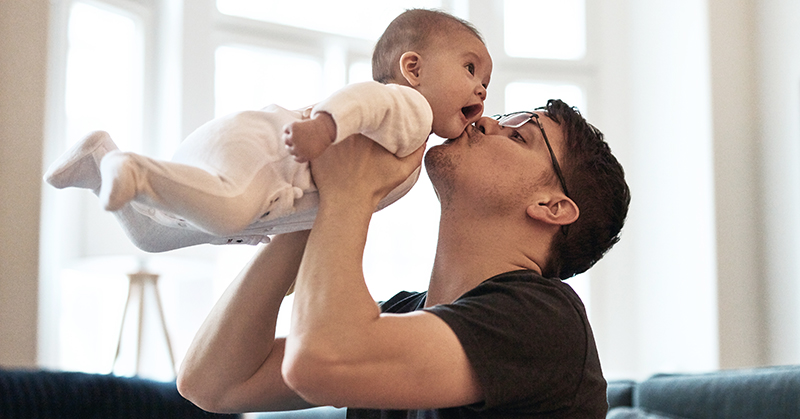
Among certain new fathers, the brain structure known as the hippocampus appears to grow larger from their partner’s pregnancy through to their child’s second year, suggests a study funded in part by the National Institutes of Health. Men who began the study with the largest hippocampal volume and had the greatest increases in hippocampal growth reported the greatest increase in feelings of attachment and bonding and lower stress levels regarding their new child.
The study authors believe the changes they observed among these new fathers may indicate successful adaptation to parenthood. They added that studying these changes and the partner and parenting experiences under which they occur may provide insights that help men better fulfill their role as fathers.
The study was conducted by Darby Saxbe, Ph.D., of the University of Southern California, and colleagues in the United States and Spain. It appears in the Journal of Neuroendocrineology. NIH funding was provided by the Eunice Kennedy Shriver National Institute of Child Health and Human Development.
Background
The hippocampus is a brain structure involved in memory formation, learning, and emotion. Previous studies of animal and human mothers have observed maternal brain changes corresponding with pregnancy, birth, and early infancy in the hippocampus as well as other brain areas. Studies of animal species in which males are involved in parenting also show brain changes in the hippocampus, but the magnitude of these changes varies with different species. The authors of the current study noted that few studies have been conducted of brain changes accompanying fatherhood in human males.
A total of 38 first-time fathers completed the study. The volunteers underwent magnetic resonance imaging scans during pregnancy, with 28 undergoing a second scan at about 30 weeks after the child’s birth and the remainder undergoing the second scan an average of 59 weeks after birth—the delay resulting from the pandemic lockdown. The fathers completed questionnaires on how thoroughly they bonded with their infants, how attached they were to their infants, and how stressful they found parenting. At each of the two visits, they provided blood samples that were analyzed for levels of testosterone and oxytocin, a hormone involved in social bonding, reproduction, and childbirth.
Results
On average, the volume of the men’s hippocampus did not differ significantly between the two visits but varied greatly between participants. Men who began the study with the largest hippocampal volume and whose hippocampal volume increased the most reported stronger parent-child bonding, greater attachment, and lower parenting stress. Men who had higher oxytocin levels at the first visit had the largest increases in the hippocampus and the largest drop in testosterone level at the second visit. The changes in hippocampal volume were seen only in the brain’s left hemisphere (half) and not in the right hemisphere.
Significance
The authors noted that understanding neurological changes that may occur during fatherhood may lead to information that helps men more successfully transition to fatherhood—important to public health because a father’s involvement in child rearing has been associated with greater child development outcomes.
The authors concluded that increases in the volume of the hippocampus accompanying fatherhood may reflect how well a new father has adapted to parenthood. They noted that the hippocampus is part of the brain network involved in social relationships and is believed to be involved in empathy. The authors theorized that growth in the hippocampus may correspond with how well they learn parenting skills.
Next Steps
Because the study included only a small number of participants, the authors called for larger studies to confirm their findings.
Reference
Saxbe, D., et al. Changes in left hippocampal volume in first-time fathers: Associations with oxytocin, testosterone, and adaptation to parenthood. Journal of Neuroendocrinology. 2023.

 BACK TO TOP
BACK TO TOP